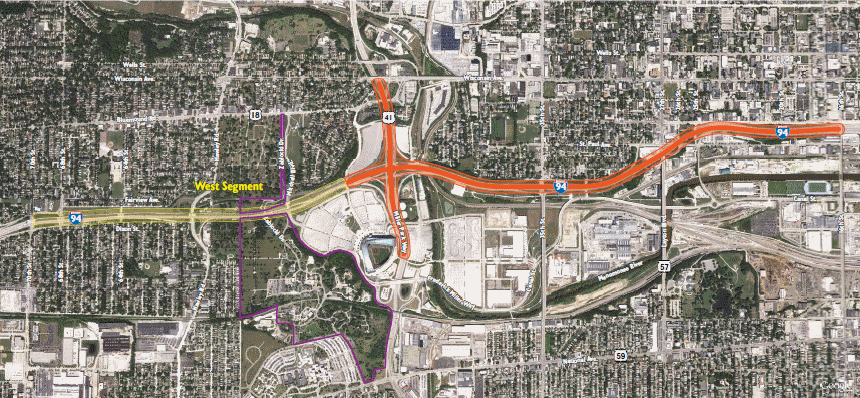Coalition Calls on State To Scrap I-94 Expansion
As local roads are increasingly underfunded and plagued with potholes, state overspends on unneeded highways and freeway expansion, a coalition of groups argue.
Potholes increasingly plague Milwaukee and other cities in Wisconsin. One study found Wisconsin now has worse local roads than 35 other states. Potholes are a danger not only to cars, but to pedestrians and drivers as people try to swerve out of their way. The problem has also increased the repair bills for motorists whose cars can be damaged by hitting a particularly bad crack, rut or pothole.
That’s one of the reasons the Coalition for More Responsible Transportation (CMRT) is against the Wisconsin Department of Transportation’s (WisDOT) proposal to add lanes to a 3.5 mile stretch of I-94 between 16th and 70th streets at a cost $850 million. The group argues the investment will raise debt and divert funds away from the repair and maintenance of local roads and also leave less funding for public transit.
CMRT held a press conference yesterday outside the WisDOT building underneath I-94 to urge WisDOT to re-evaluate the budget and refurbish local roads and increase accessibility to public transit instead of widening I-94. CMRT believes that the proposed development on I-94 will have a detrimental effect on taxpayers, businesses, and health.
There has been an emphasis on highway development in Wisconsin for years. In fact, a report by WISPIRG found that of the $6.5 billion allocated to major highway development projects and road repairs in the two previous biennial state budgets, $2.5 billion went to building big new highways. In addition, spending on highway construction between 1998 and 2013 has increased by 50 percent while state transit funding decreased by almost 2 percent.
Because there is no need to widen I-94, the development will divert taxpayer money from projects that would have more economic impact. A report by WISPIRG, Sierra Club and 1000 Friends of Wisconsin found that by scaling back highway expansion projects, the state could save taxpayers nearly $500 million in the coming biennium. The savings could then reduce the state’s reliance on bonding and spending money on interest payments, and instead be spent on local priorities like road repair, transit and bike/pedestrian infrastructure. “Wisconsin needs a responsible transportation budget,” said Elizabeth Ward, Sierra Club John Muir Chapter. “We should invest our limited transportation funds in the most critical priorities while looking for savings wherever possible. And we have to take a particularly hard look at multibillion-dollar investments in major highway expansion projects, especially since Wisconsinites are driving less.”
CMRT also believes that the development of I-94 will have a negative impact on businesses around the Milwaukee area. More funding for highways means less funding for fixing local roads and less accessibility for public transit, which can impede people from reaching their place of employment, school, and medical care. As veteran Capitol reporter Matt Pommer has written, “fifteen years ago, 40 percent of the state transportation fund was returned to municipal and county governments. Now, less than one-third of that fund returns to local governments.” That has had a negative impact on all local roads, but particularly in metro Milwaukee. He notes a 2013 study which found “more than half of the roads in the Milwaukee area were in poor condition. It suggested that road conditions cost Milwaukee-area drivers an average of about $700 per year in vehicle repairs.”
Jeff Roznowski, Alderman for Wauwatosa’s 6th District, noted the potential impact on business: “We need to recognize the economic impact of having good transportation connectivity options throughout the Milwaukee metro area, one that connects workers and shoppers from Milwaukee to retail and employment destinations in Wauwatosa, such as the Regional Medical Center and Mayfair Mall.”
Another issue is that over-spending on freeways and highways can reduce money available for public transit. “People of color and people with disabilities are much more likely to depend on public transportation,” said Karyn Rotker, Senior Staff Attorney for ACLU of Wisconsin. “We need a plan that meaningfully addresses the needs of those communities, not one that just spends hundreds of millions of dollars to build bigger highways.”
Less public transportation and more emphasis on cars can also lead to an increase in air and water pollution. “The resulting air pollution increases the severity of asthma, as well as causes increased rates of heart attacks, strokes and preterm birth – all with devastating results,” said Jeanne Hewitt, Associate Professor and Community Outreach Director of UW-M’s Children’s Environmental Health Sciences Core Center.
“Our problems can’t be fixed simply by borrowing or raising more revenue for transportation – we have to fix our spending priorities,” said Peter Skopec, WISPIRG Director, “The choice before state leaders is clear: Do we continue to spend billions of dollars on questionable highway expansion projects, above and beyond the cost of simply repairing these highways, and leave local infrastructure to crumble? Or do we choose to live within our means and make sure that our transportation dollars are spent in ways that actually benefit communities across Wisconsin?”
If you think stories like this are important, become a member of Urban Milwaukee and help support real, independent journalism. Plus you get some cool added benefits.
More about the I-94 East-West Expansion
- Transportation: 27th Street Bridge Closes Next Week - Graham Kilmer - Jan 26th, 2026
- Transportation: 27th Street Bridge Will Close For A Year - Graham Kilmer - Nov 29th, 2025
- Coalition Raises Concerns on I-94 Construction - Sierra Club - Nov 12th, 2025
- Construction Starting On $1.7 Billion Interstate 94 Widening - Jeramey Jannene - Oct 15th, 2025
- Governor Evers approves first segment of I-94 East-West construction to begin in Milwaukee County - Wisconsin Department of Transportation - Oct 15th, 2025
- Transportation: Fix At Six Coalition Sues State, Federal Government Over I-94 Expansion - Graham Kilmer - Aug 20th, 2024
- WisDOT to host I-94 East-West Freeway Project public meetings - Wisconsin Department of Transportation - Jun 12th, 2024
- Open Houses Announced For I-94 Widening - Jeramey Jannene - Jun 6th, 2024
- ‘Fix at Six’ Group Wants I-94 Expansion Delayed For Civil Rights Report - Jeramey Jannene - Mar 20th, 2024
- Coalition Admonishes I-94 expansion Record of Decision - Sierra Club - Mar 20th, 2024
Read more about I-94 East-West Expansion here





















Such quality writing… right off the bat, in the very first paragraph, second sentence even, is a COMPLETE FABRICATION. The “2012 study” mentioned isn’t cited in this story OR in the story in the link. Once the actual source was found, it turns out the study was for state highways, not local roads. What kind of crap is this??
Next, same paragraph, without citations, it vaguely mentions a recent “study” that said car owners are spending $700 a year on auto repairs because of potholes. Really? $700? No wonder that number wasn’t mentioned.
Second paragraph, It’s not $850 million to add a lane… it’s to replace crumbling road infrastructure and improve safety and while they are at it they’re adding a lane. The extra lane does not cost $850 million by itself. Also, that $850 can not just go to local roads, most of it is federal money.
This story is also again part of a long line that cite the 1000 Friends highly flawed analysis.
I’m not even going to finish reading this… it’s probably the worst piece I’ve seen on this topic yet.
I asked you this in the other story about the I-94 expansion, but I’ll ask again here because this is newer. I understand that congestion is an issue now, but if we widen it and congestion isn’t reduced or is a problem again in 5 years, is it the best move? Is widening it the only way to improve safety?
It’s not fair or necessarily right but not expanding between 16th & 70th streets would be a terrible move at this point. The Marquette Interchange has already been expanded up to 16th street and the Zoo Interchange will expand lanes through 84th street or so. Not expanding the middle between the two would purposefully create a bottleneck. I’m not saying that it needed to be done in the first place but stopping halfway through?
PMD, sorry I missed that question last time. The rebuild is happening now, the time to add a lane is now. They won’t do it again in 5-10 years or even 25. And if you saw my explanation on the last one, even if we fill capacity in only a few years, it won’t be from sudden sprawl, so that means we’ve relieved congestion from other places. You can’t look at the induced demand too narrowly, you have to understand the cause and effect in each scenario in a broader context of a geographical area.
PMD, since you love this issue so much: There is currently a capacity issue on this section of I-94. The road is approaching the end of its useful life. There are safety improvements that can be made. What’s your preferred solution to the problem? Because so far, the only things I’ve seen are calls to ignore the problems until the freeway collapses or rebuild the freeway.
AG no need for apology. There’s been a lot of posting going on lately. But if we are congested all over again in a few years, what’s the point of expansion? Isn’t there a difference between upkeep/necessary maintenance and expansion?
You can’t look at it too narrow. When you say “if we are congested all over again” are you asking in regard to 94 or are you referring to other roads that are sharing their volume with the now expanded 94? Because as I was saying, the congestion comes from somewhere… either other congested roads that are ready to shed some cars, or from growth/expansion of the driving population. So even if 94 gets congested right away, those cars come from other congested roads that now saw relief. So really we’re affected more then the 94 corridor, making the whole area safer.
If we get low enough congestion, then we can see an increase in the rate of sprawl… but I don’t think the growth in the metro area is great enough to see some sudden boom in building.
I was asking in regard to 94. Is I-94 considered unsafe right now? I have driven it on a fairly regular basis for 18 years and it has never struck me as particularly dangerous compared to 43 or 41 or other highways I’ve driven regularly.
Kyle I believe it is important to maintain our infrastructure. I don’t want to see roads and bridges crumble (or worse). My hesitation has to do with expanding roadways, not maintaining them.